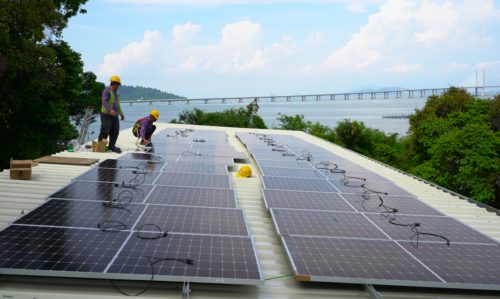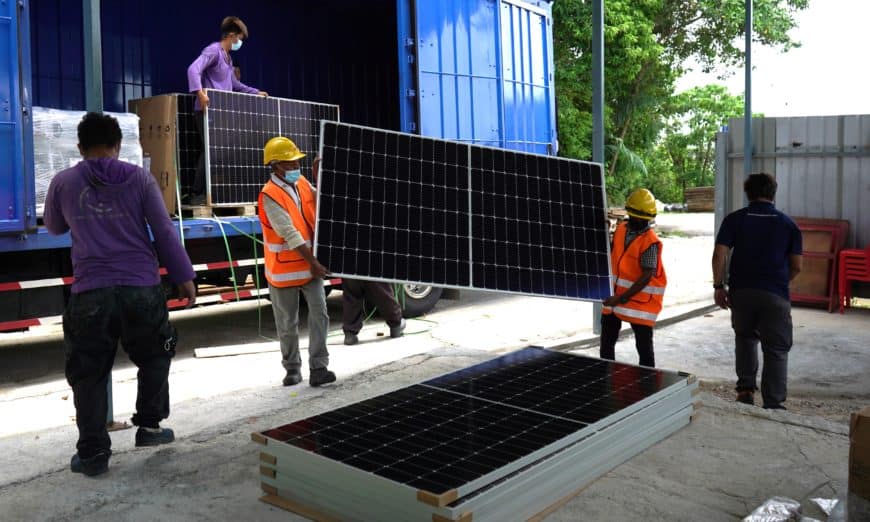In line with the commitment to build an ESG- (environment, social and governance) compliant Penang South Islands’ (PSI), the project’s site offices will strive to use renewable resources to meet their operational needs.
SRS Consortium deputy project director Azmi Mohamad said the Marine Operation Control Centre (MOCC) in Batu Maung was only the first PSI project office to be fitted with solar panels, and more would follow.
MOCC will monitor vessel movements around the PSI site during reclamation.
“As the project progresses, we also plan to use solar power at Pusat Perkhidmatan Setempat Nelayan (PPSN) Permatang Damar Laut, and the future project office in Batu Maung, where management and administrative staff will be based.
“This is in line with our commitment to building a low-carbon development and support efforts to become more climate resilient. We must walk the talk, even in our non-construction activities,” he said in a statement released by Penang Infrastructure Corporation (PIC).
SRS Consortium and PIC were earlier reported to be entering a joint venture to reclaim Island A, one of the three islands under the PSI project.

PSI is being master planned according to recommendations of the Green Plan and Low Carbon Cities Framework that aim to reduce greenhouse gas emissions.
The MOCC’s solar panels, which were installed on April 15, just a week before Earth Day on April 22, will generate 11.83 kWp (kilowatts peak) to power the centre’s operations.
Azmi said based on an estimated power demand of 10kW for 12 hours per day, the solar panels would help the MOCC reduce 12 tonnes or 40% carbon emissions a year, in line with the National Physical Planning Council’s recommendation to build a low carbon development to address climate change.
“The materials that make up this solar power system can last up to 30 years. We believe that investing in solar power is worth the time and effort.
“Most importantly, we can significantly reduce greenhouse gas or carbon emission from energy that comes from burning fossil fuels in the long run,” Azmi said.
According to the PIC statement, the project is also looking at introducing solar-powered streetlights for the MOCC in the future. For now, the PPSN offices in Permatang Damar Laut, Sungai Batu and Gertak Sanggul are already using them.
Apart from using solar power, the MOCC and PPSN Permatang Damar Laut are also using rainwater harvesting systems to collect water for cleaning and landscaping.
In the future, both initiatives will be adopted at other project premises, alongside eco-friendly energy-saving lighting, air conditioning (inverter) and ventilation systems; and water-saving faucets and flush system.
“Although what we are doing now may be small, we will expand our green efforts as the project moves,” Azmi added.
“We are sure these initiatives will bring good impact, and help raise awareness on ESG practices and practices that contribute towards climate resilience.”
PIC chief executive officer Datuk Seri Farizan Darus said the PSI project, especially through the activities organised by the three PPSNs, was in a good position to promote ESG principles.
Apart from serving as one-stop information centres on PSI, PPSN organises briefings, engagements, social welfare and awareness programmes for the local community, especially fishermen families.
Awareness programmes like recycling activities and beach clean-ups are among PPSN’s activities.
“We can help raise awareness through PPSN activities with the people, namely the locals in Permatang Damar Laut, Sungai Batu and Gertak Sanggul.
Farizan said it was important for the public to be aware and alert of environmental issues like climate change, and change their daily habits to be kinder to the environment.
“If we change our habits and adopt these green practices consistently, together we can make a positive difference in the long run,” he said.

